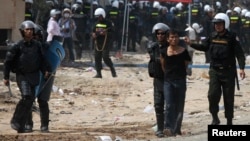A year after military police opened fire on a group of labor protesters here killing five, their families still mourn and hope for justice.
Pheng Kosal was among the demonstrators killed January 3, 2014, while demanding higher wages. His $100 monthly salary had helped his single mother and his seven siblings survive.
Since Kosal’s death, his mother Keo Sokmeng, 50, has struggled to support the family on her own salary, also just $100 a month. From that, she must pay the rent on their small house, as well as water, electricity, school fees, food and other expenses.
“I relied on him more than [on] the other kids, since he was the most educated and the smartest,” Keo Sokmeng said.
Her son had been a good student, but he quit school after his father died and went to work for a garbage collection company. He studied to become a mechanic and, once he was qualified, got a better-paying factory job.
“He loved his job…. He had never caused me any trouble,” Keo Sokmeng said. “The money he got from his job he helped me support his brothers and sisters.”
Since losing that income, Keo Sokmeng said, she has had to send two of her children to live with relatives.
“My 16-year-old-daughter stays with my sister in Kampoong Cham,” she said. “My other son went to his uncle’s house in Kandal.”
The loss of Pheng Kosal has devastated her family. “If I had known that the military shot people, I would not have let him go”said Keo Sokmeng, referring to the protests.
“I told him, 'Don’t go son,'” she said. “He said, 'Mother we should help each other. When we get the money, we all get the money together. We should not wait for others to do it for us. We should help each other.'”
Rallying for higher pay
Starting in late 2013, workers began demanding a minimum wage of $160 a month for the more than 600,000 Cambodians who work in footwear and garment factories, which are mostly foreign-owned. At the time, the minimum wage was $80 a month. The government was offering to raise it to $100 and has since boosted it to $128 a month, effective January 1, 2015.
On January 3 last year, thousands of workers gathered on Veng Sreng Street, in an industrial area. When police tried to contain the crowd, the protesters fought back with sticks, rocks and firebombs. Police fired into the crowd, killing five and injuring about 30 people.
Besides Pheng Kosal, the dead included Yann Rithy, 26. His widow, Chhiv Sarun, 25, said no government official has ever spoken to her about what happened that day.
“There’s no compensation, no nothing. The shooters are not found,” she said. “In Cambodia if one has money, one can do anything.”
She said that she did not know that her husband had been shot until one of his friends ran to their home to tell her.
“I feel very lonely now that he died. I have to feed my son alone.” she said. “The monthly salary is not enough to pay for the monthly expenses.”
No one held accountable
The military police and other government agencies conducted a joint investigation of the shooting but no one was ever punished, frustrating the protesters and their families as well as Cambodian human rights activists.
Kheng Tito, a spokesman for national military police, said the probe is now finished, though he did not rule out further investigation if new evidence emerges.
“If they demand anything, we’ll do more investigation,” he said. He declined to elaborate, referring any further questions to the Ministry of Interior.
However, police arrested 23 protesters in the weeks after the shooting. Rights group protested, saying the 23 had not committed any crimes.
Am Sam Ath of the rights group Licadho, blames the inaction on a national culture of impunity.
“No one has been [held] responsible for the acts. No one has been arrested or punished,” he said.
“Twenty-three workers and moto-taxi drivers were arrested and put in jail beside the six union workers who were put under the court’s supervision,” added Am Sam Ath.
Keo Sokmeng wants justice for her son, but that is not her first concern.
“I might have to send my 9-year-old girl to the province if I cannot manage things,” she said. “If I did not have to be responsible for my kids, I would search for justice.”




